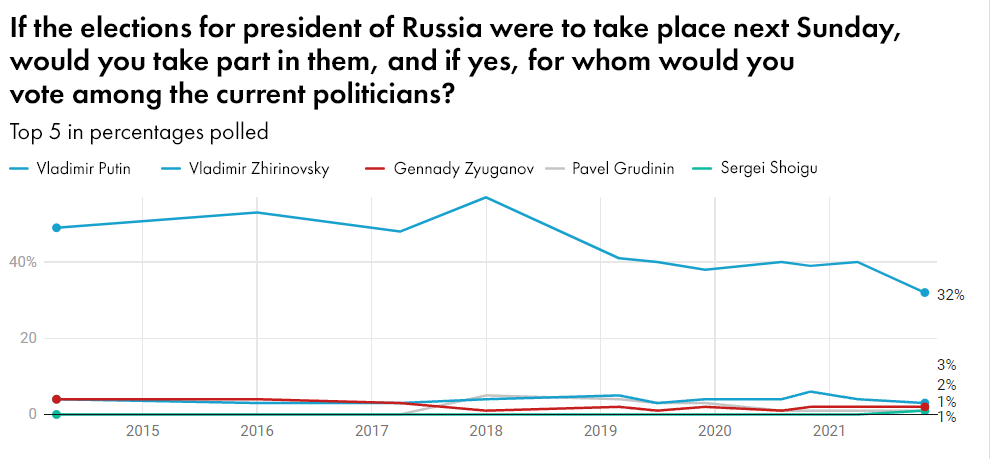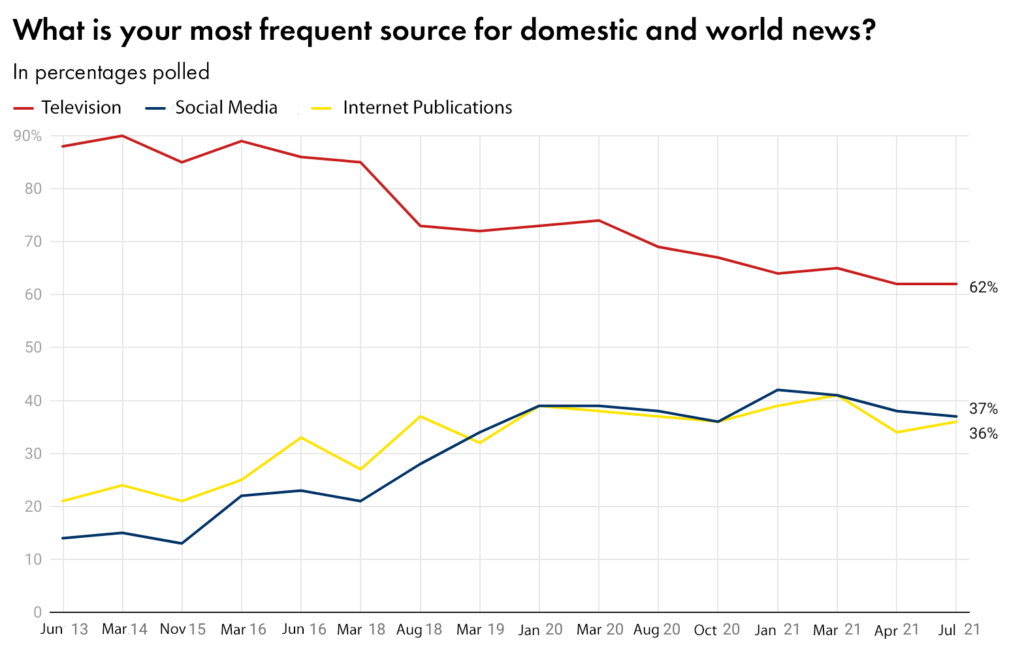It is hard to summarize dispassionately the results of the outgoing year 2021 – it turned out to be just too turbulent. And this turbulence did not let up for even a second, even in the days running up to New Year’s Eve. There were new arrests of Alexey Navalny’s colleagues, the hasty liquidation of Memorial Society, and the unprecedented war hysteria from Putin and Russian state propaganda – all of this not only diminished the holiday mood but let us know that we can hardly expect calm in the coming year.
Nevertheless, we must preserve our composure in the current situation. It is important to understand that Putin’s current domestic and foreign policy hysteria has only one understandable cause: a growing lack of confidence in his own powers amid an unprecedentedly low level of support and the loss of positions in the world.
Very little time remains until 2024, when Putin has planned for himself not just the next extension of his presidential term, but essentially the start of a presidency for life. But his ratings are worse than ever. According to the latest poll from the Levada Center (https://www.levada.ru/2021/12/09/elektoralnye-rejtingi-partij-i-prezidenta/, Putin’s real rating has fallen to 32%. That means he is practically guaranteed to lose the next presidential election to an opponent who will go into the second round with him.

The demographic trend is also important here: the same Levada Center polls indicate that more than half of Russians under the age of 40 oppose the extension of Putin’s term after 2024, and Putin has an assured majority only among the oldest age group of Russians. Clearly, in the next two years, this will heavily influence the general sociological alignment, simply for natural demographic reasons.
The State Duma elections in September demonstrated that the party of power manages to describe itself as a majority in the elections only through unprecedented falsifications. According to calculations by the electoral mathematician Sergei Shpilkin, United Russia ascribed to itself 14 out of 28 million votes, that is, half. If the counting had been honest, the party of power would have received only 200 or so seats in the Duma; that is, it would have lost the majority and would have become merely a large faction. The Duma elections prove that the government can still secure for itself the necessary scale of falsifications to preserve the majority, but this all comes at the price of incredible effort and unprecedented repression. Putin’s very active personal participation in the United Russia campaign – the first since 2007 – could not raise the party’s rating. Putin’s magic wand no longer works.
This means an extremely poor prospect for the Russian dictator; extending power in 2024 is turning from an easy stroll into a serious battle for him. Especially given Alexey Navalny’s working strategy of “smart voting,” which the regime threw every effort into battling. Despite the fact that the “smart candidates” did not manage to deprive United Russia of a majority, in a significant number of voting districts, the fight between them and the party of power’s representatives was equal (in more than 80% of districts, “smart voting” candidates took first or second place). Next time, a little less in-fighting and a little more mobilization of opposition-minded citizens around this strategy could bring greater success.
For Putin, there is another piece of bad news: his propaganda television is losing its influence. Not as rapidly as one would like, but for a fact: if we look at yet another Levada Center poll conducted last year by Rossiyskiy medialandshaft [Russian Media Landscape] (https://www.levada.ru/2021/08/05/rossijskij-medialandshaft-2021/), the fall in the popularity of Putin’s TV staggers the imagination. Since 2014, the percentage of Russians who use TV as the basic source of their information has dropped from more than 90% to 60%. Accordingly, the percentage of those relying on the Internet rose to nearly 40%. Clearly, by 2024, these curves will not just meet, but most likely the Internet will overtake Putin’s television as the basic source of news for Russians.

Of course, the Internet should not be considered as totally the opposition’s territory. But social media by definition is more pluralistic than the propaganda television screen staged by the Kremlin, and Putin has failed to control the minds of Russians through the Internet using the standard media script. He understands this, which explains the growing pressure of censorship on Ru.net. But we should not panic here, either. Although we can expect a lot of news of the blocking of important independent web sites, on the whole, the authorities are trailing in its wake. Although the obstructions cause people a lot of inconveniences, on the one hand, many have already learned how to circumvent them, and on the other, the truth about what is going on in Russia still reaches people and cannot be hidden. In that sense, the government has been unable to mount a full-fledged Chinese firewall.
Yet another important result of the passing year – Putin’s failed attempt to destroy the movement of Alexey Navalny’s supporters. The dictator calculated that by forcing Navalny’s colleagues into emigration, he would make them irrelevant, like many past generations of opposition members. But it turned out otherwise; modern technologies enable their continued effective broadcasting to Russia, thus increasing their audience and number of new supporters. The attempt to destroy the opposition failed; the opposition’s audience figures have nearly returned to the levels before Navalny’s arrest. Hence the new arrests and criminal cases – but Putin can no longer stop the resistance.
The economic situation is no better; the federal budget for the next three years signed by Putin (https://vot-tak.tv/novosti/18-10-2021-byudzhet-milov/) does not provide for a significant growth in Russians’ incomes, i.e. a solution to the fundamental problem causing the collapse of Putin’s ratings. The government’s forecast pledges a growth of real incomes in 2022-2024 at best by 2-2.5% with inflation at 4% — that is, if inflation will be lower, even this miniscule rise will not occur. This year, inflation, in Putin’s expression, has already “eaten into” the indexation of pensions – in real terms, pensions have been falling since February, and in October fell to 2.5% of October 2020. Pension reform has failed miserably, and the one-time 10,000-ruble payments (US $136) have not solved this problem.
Thus, by all criteria, Putin can expect a very difficult 2024. Foreign affairs are no better. He failed to draw the Biden Administration into a new “reboot” of relations. The new German government is not only taking a harder position regarding Putin; it reflects general systemic changes in German policy regarding Russia. For example, Christine Lambrecht, the new German defense minister from the SDP (who are seemingly traditional advocates of a soft Ostpolitik) made her first international visit to Lithuania, whose relations with Putin are near zero, and made quite hardline statements there about not letting Putin dictate terms to NATO. Putin contrived to quarrel even with quite loyal France; at the culmination of the 2+2 meeting in November, the French ministers of defense and foreign affairs released a statement that was unprecedentedly harsh by French diplomatic standards (https://www.diplomatie.gouv.fr/en/country-files/russia/news/article/russia-meeting-of-the-minister-for-europe-and-foreign-affairs-and-the-minister). They condemned Russia’s actions across the board, from the atrocities of the Wagner private military contractors in Africa to the threatening of Ukraine and the situation with Navalny – there was not a single positive word. The escalation of the situation around Ukraine has noticeably consolidated the democratic countries; there are no signs of division regarding the need to deter Putin. Clearly, none of his “red lines” will be accepted.The hysterics we observe from the Russian leadership in domestic and foreign policy are an immediate reaction to the worsening of the domestic and foreign situation for Putin. The Russian dictator refuses to understand that his time is up; that Russian society is refusing to accept him as a leader, and the understanding is growing and strengthening in the world of the need for a tougher rebuff of the totally unbridled Russian ruler. Everything is working against Putin – trends in the media, demographics, and the economy. Again, he does not have a life-saving magic wand.
Of course, he will not give up easily, so the sad news is that in 2022, we must expect a worsening of repression and new escalations of the international situation. But history cannot be turned back; although Putin does try, in the literal sense of the word, to rewrite the history of Russia and its neighbors. To rephrase the saying ascribed to Lincoln, you can repress part of the people for a long time, or all of the people for a short time, but you cannot keep all of society endlessly in fear and the grips of repression. The bad news is that the finale of the Putin dictatorship will be quite dramatic. The good news is that this finale is inevitable. All objective factors prove that we are moving to the denouement.
